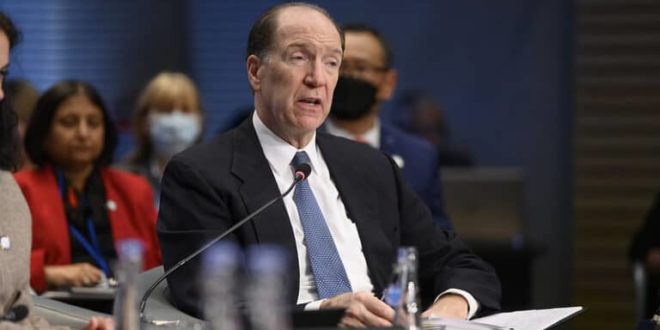By Matteo Civillini, Climate Home News
World Bank president David Malpass will step down from his post in June, nearly a year before his term is due to expire.
Malpass received strong criticism over the bank’s commitment to climate action and over his personal views on climate change.
He had been under increasing pressure since last September, when he refused to publicly accept that burning fossil fuels is warming the planet.
Malpass was asked during an event on the sidelines of the UN general assembly whether he agreed with the scientific consensus on climate change.
The World Bank chief repeatedly dodged the question, to heckling from the audience, before eventually responding “I’m not a scientist”.
Malpass’ departure comes as the World Bank signalled its intention to make climate action more central to its mission.
In its “evolution roadmap” published in January, the World Bank said it “must evolve its mission” to address the crisis facing development and “support climate action”.
This followed calls on the World Bank from US, Germany and other government to launch “fundamental reform” on its climate agenda.
“Reached new records in climate financing”
Malpass did not say why he was leaving, only publishing in a statement that “after a good deal of thought, I’ve decided to pursue new challenges”.
Malpass said he was proud of what was achieved during his term. “We’ve worked hard to reduce poverty, increase economic growth, reduce government debt burdens, and improve living standards across the full range of human development”, he said.
He also added that under his tenureship the World Bank “reached major new records in financing levels, including climate financing”.
The World Bank said it delivered $31.7 billion in the fiscal year 2022 to help countries address climate change – a 19% increase on the previous period.
The bank, however, has come under fire for how it counts its climate spending.
Research by Oxfam – based on the World Bank’s climate funding in 2020 – claimed up to 40% of its spending could not be independently verified.
A Trump-appointee
A former investment-bank economist and Treasury official, Malpass was appointed by then US President Donald Trump in 2019.
The United States is the World Bank’s biggest shareholder and a long-standing tradition gives the US government the right to select the head of the World Bank.
However, Nadia Daar, the head of the Washington office of Oxfam International, said the process should be opened to more candidates to improve the credibility of the institution.
“If shareholders really want to ‘evolve’ the WorldBank, Malpass’ successor must be hired based on an open and merit-based selection process,” she said on Twitter.
Sonia Dunlop, public banks lead at the E3G think tank said the next leader “must be a visionary with deep understanding of the food, energy and development crises gripping the world, have climate change as the one of the top priorities, be profoundly committed to multilateralism and have the full backing of developed and developing countries.”
She added: “It is of course high time that the world’s development bank had a woman at the helm.”
All the bank’s 12 presidents have been American men and all but Korean-American Jim Yong Kim have been white.
 Home Of Ghana News Ghana News, Entertainment And More
Home Of Ghana News Ghana News, Entertainment And More




